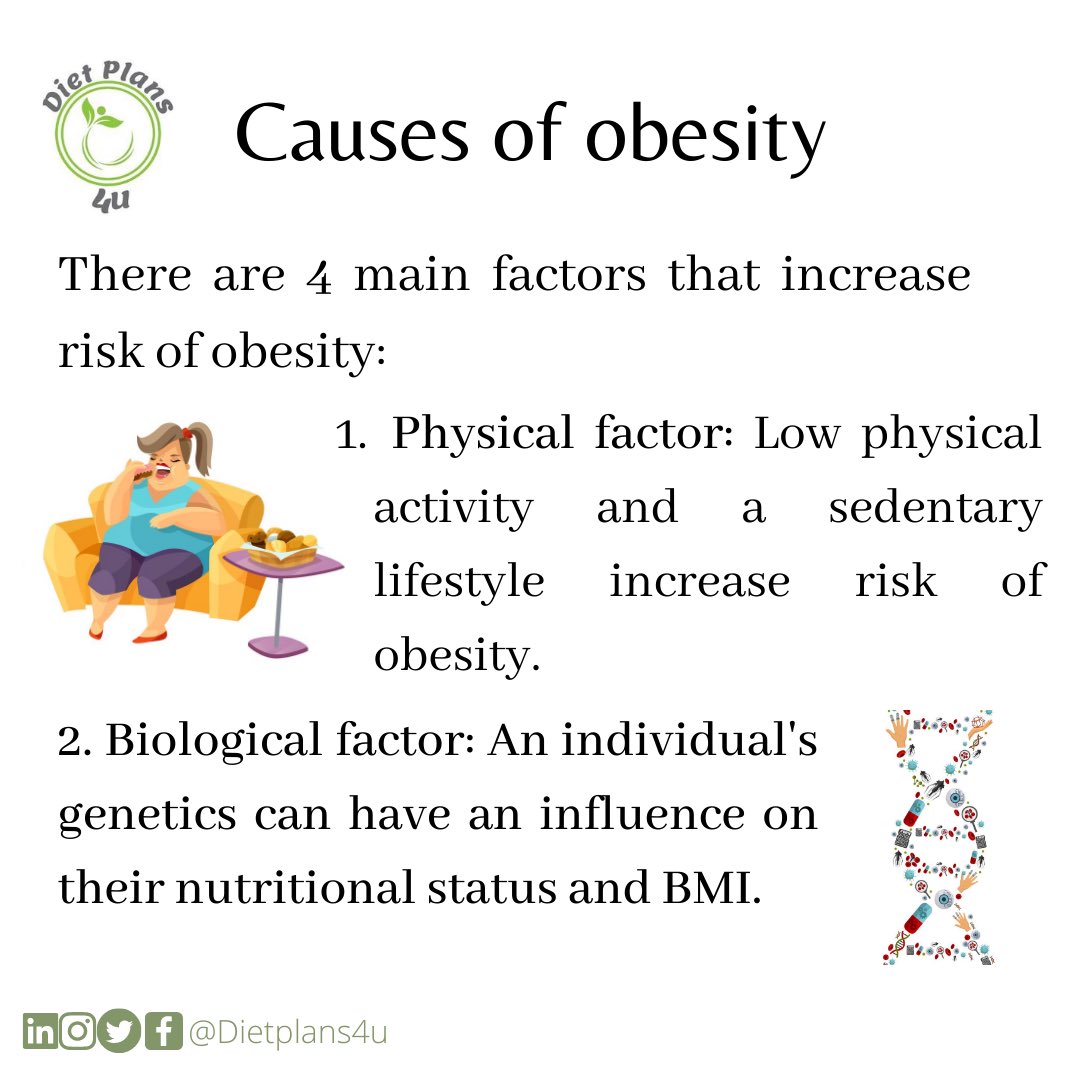There’s an increasing prevalence of obesity worldwide. About 1 in every 10 people are obese!
Obesity increases the risk of non-communicable diseases (NCDs) such as Type 2 diabetes, cardiovascular diseases, cancer, osteoarthritis and chronic respiratory diseases.
Obesity increases the risk of non-communicable diseases (NCDs) such as Type 2 diabetes, cardiovascular diseases, cancer, osteoarthritis and chronic respiratory diseases.
Obesity is measured using Body Mass Index. It is a person’s weight divided by the square of their height in metres (kg/m2).
Overweight is BMI between 25-29.9kg/m2
Obesity is BMI >30kg/m2
Overweight is BMI between 25-29.9kg/m2
Obesity is BMI >30kg/m2
There are many things that can cause obesity. Outlined are 4 major factors that contribute to increased risk of obesity:
1. Physical factors. Low physical activity. https://abs.twimg.com/emoji/v2/... draggable="false" alt="🏋🏾" title="Person lifting weights (durchschnittlich dunkler Hautton)" aria-label="Emoji: Person lifting weights (durchschnittlich dunkler Hautton)">
https://abs.twimg.com/emoji/v2/... draggable="false" alt="🏋🏾" title="Person lifting weights (durchschnittlich dunkler Hautton)" aria-label="Emoji: Person lifting weights (durchschnittlich dunkler Hautton)">
2. Biological factor. https://abs.twimg.com/emoji/v2/... draggable="false" alt="🧬" title="DNA" aria-label="Emoji: DNA">
https://abs.twimg.com/emoji/v2/... draggable="false" alt="🧬" title="DNA" aria-label="Emoji: DNA">
3. Sociocultural factor. https://abs.twimg.com/emoji/v2/... draggable="false" alt="👥" title="Silhouette von Büsten" aria-label="Emoji: Silhouette von Büsten">
https://abs.twimg.com/emoji/v2/... draggable="false" alt="👥" title="Silhouette von Büsten" aria-label="Emoji: Silhouette von Büsten">
4. Economic factor. https://abs.twimg.com/emoji/v2/... draggable="false" alt="💵" title="Banknote mit Dollar-Zeichen" aria-label="Emoji: Banknote mit Dollar-Zeichen">
https://abs.twimg.com/emoji/v2/... draggable="false" alt="💵" title="Banknote mit Dollar-Zeichen" aria-label="Emoji: Banknote mit Dollar-Zeichen">
1. Physical factors. Low physical activity.
2. Biological factor.
3. Sociocultural factor.
4. Economic factor.
How do you prevent obesity?
1. Exercise regularly https://abs.twimg.com/emoji/v2/... draggable="false" alt="🏋🏾" title="Person lifting weights (durchschnittlich dunkler Hautton)" aria-label="Emoji: Person lifting weights (durchschnittlich dunkler Hautton)">. Do at least 150minutes of moderate-intensity exercises per week.
https://abs.twimg.com/emoji/v2/... draggable="false" alt="🏋🏾" title="Person lifting weights (durchschnittlich dunkler Hautton)" aria-label="Emoji: Person lifting weights (durchschnittlich dunkler Hautton)">. Do at least 150minutes of moderate-intensity exercises per week.
2. Maintain a healthy diet https://abs.twimg.com/emoji/v2/... draggable="false" alt="🥗" title="Grüner Salat" aria-label="Emoji: Grüner Salat">. Reduce intake of saturated fat, refined sugar and salt; increase intake of fruits and vegetables, whole grains and enough water.
https://abs.twimg.com/emoji/v2/... draggable="false" alt="🥗" title="Grüner Salat" aria-label="Emoji: Grüner Salat">. Reduce intake of saturated fat, refined sugar and salt; increase intake of fruits and vegetables, whole grains and enough water.
1. Exercise regularly
2. Maintain a healthy diet
How you manage obesity?
You need the help of a dietitian to manage obesity, especially when it comes to lifestyle modifications.
Medications and bariatric surgery are other ways to manage obesity.
@Dietplans4u_ have a team of dietitians who are ready to help. Contact us today!
You need the help of a dietitian to manage obesity, especially when it comes to lifestyle modifications.
Medications and bariatric surgery are other ways to manage obesity.
@Dietplans4u_ have a team of dietitians who are ready to help. Contact us today!

 Read on Twitter
Read on Twitter

 2. Biological factor. https://abs.twimg.com/emoji/v2/... draggable="false" alt="🧬" title="DNA" aria-label="Emoji: DNA"> 3. Sociocultural factor. https://abs.twimg.com/emoji/v2/... draggable="false" alt="👥" title="Silhouette von Büsten" aria-label="Emoji: Silhouette von Büsten">4. Economic factor. https://abs.twimg.com/emoji/v2/... draggable="false" alt="💵" title="Banknote mit Dollar-Zeichen" aria-label="Emoji: Banknote mit Dollar-Zeichen">" title="There are many things that can cause obesity. Outlined are 4 major factors that contribute to increased risk of obesity:1. Physical factors. Low physical activity. https://abs.twimg.com/emoji/v2/... draggable="false" alt="🏋🏾" title="Person lifting weights (durchschnittlich dunkler Hautton)" aria-label="Emoji: Person lifting weights (durchschnittlich dunkler Hautton)">2. Biological factor. https://abs.twimg.com/emoji/v2/... draggable="false" alt="🧬" title="DNA" aria-label="Emoji: DNA"> 3. Sociocultural factor. https://abs.twimg.com/emoji/v2/... draggable="false" alt="👥" title="Silhouette von Büsten" aria-label="Emoji: Silhouette von Büsten">4. Economic factor. https://abs.twimg.com/emoji/v2/... draggable="false" alt="💵" title="Banknote mit Dollar-Zeichen" aria-label="Emoji: Banknote mit Dollar-Zeichen">">
2. Biological factor. https://abs.twimg.com/emoji/v2/... draggable="false" alt="🧬" title="DNA" aria-label="Emoji: DNA"> 3. Sociocultural factor. https://abs.twimg.com/emoji/v2/... draggable="false" alt="👥" title="Silhouette von Büsten" aria-label="Emoji: Silhouette von Büsten">4. Economic factor. https://abs.twimg.com/emoji/v2/... draggable="false" alt="💵" title="Banknote mit Dollar-Zeichen" aria-label="Emoji: Banknote mit Dollar-Zeichen">" title="There are many things that can cause obesity. Outlined are 4 major factors that contribute to increased risk of obesity:1. Physical factors. Low physical activity. https://abs.twimg.com/emoji/v2/... draggable="false" alt="🏋🏾" title="Person lifting weights (durchschnittlich dunkler Hautton)" aria-label="Emoji: Person lifting weights (durchschnittlich dunkler Hautton)">2. Biological factor. https://abs.twimg.com/emoji/v2/... draggable="false" alt="🧬" title="DNA" aria-label="Emoji: DNA"> 3. Sociocultural factor. https://abs.twimg.com/emoji/v2/... draggable="false" alt="👥" title="Silhouette von Büsten" aria-label="Emoji: Silhouette von Büsten">4. Economic factor. https://abs.twimg.com/emoji/v2/... draggable="false" alt="💵" title="Banknote mit Dollar-Zeichen" aria-label="Emoji: Banknote mit Dollar-Zeichen">">
 2. Biological factor. https://abs.twimg.com/emoji/v2/... draggable="false" alt="🧬" title="DNA" aria-label="Emoji: DNA"> 3. Sociocultural factor. https://abs.twimg.com/emoji/v2/... draggable="false" alt="👥" title="Silhouette von Büsten" aria-label="Emoji: Silhouette von Büsten">4. Economic factor. https://abs.twimg.com/emoji/v2/... draggable="false" alt="💵" title="Banknote mit Dollar-Zeichen" aria-label="Emoji: Banknote mit Dollar-Zeichen">" title="There are many things that can cause obesity. Outlined are 4 major factors that contribute to increased risk of obesity:1. Physical factors. Low physical activity. https://abs.twimg.com/emoji/v2/... draggable="false" alt="🏋🏾" title="Person lifting weights (durchschnittlich dunkler Hautton)" aria-label="Emoji: Person lifting weights (durchschnittlich dunkler Hautton)">2. Biological factor. https://abs.twimg.com/emoji/v2/... draggable="false" alt="🧬" title="DNA" aria-label="Emoji: DNA"> 3. Sociocultural factor. https://abs.twimg.com/emoji/v2/... draggable="false" alt="👥" title="Silhouette von Büsten" aria-label="Emoji: Silhouette von Büsten">4. Economic factor. https://abs.twimg.com/emoji/v2/... draggable="false" alt="💵" title="Banknote mit Dollar-Zeichen" aria-label="Emoji: Banknote mit Dollar-Zeichen">">
2. Biological factor. https://abs.twimg.com/emoji/v2/... draggable="false" alt="🧬" title="DNA" aria-label="Emoji: DNA"> 3. Sociocultural factor. https://abs.twimg.com/emoji/v2/... draggable="false" alt="👥" title="Silhouette von Büsten" aria-label="Emoji: Silhouette von Büsten">4. Economic factor. https://abs.twimg.com/emoji/v2/... draggable="false" alt="💵" title="Banknote mit Dollar-Zeichen" aria-label="Emoji: Banknote mit Dollar-Zeichen">" title="There are many things that can cause obesity. Outlined are 4 major factors that contribute to increased risk of obesity:1. Physical factors. Low physical activity. https://abs.twimg.com/emoji/v2/... draggable="false" alt="🏋🏾" title="Person lifting weights (durchschnittlich dunkler Hautton)" aria-label="Emoji: Person lifting weights (durchschnittlich dunkler Hautton)">2. Biological factor. https://abs.twimg.com/emoji/v2/... draggable="false" alt="🧬" title="DNA" aria-label="Emoji: DNA"> 3. Sociocultural factor. https://abs.twimg.com/emoji/v2/... draggable="false" alt="👥" title="Silhouette von Büsten" aria-label="Emoji: Silhouette von Büsten">4. Economic factor. https://abs.twimg.com/emoji/v2/... draggable="false" alt="💵" title="Banknote mit Dollar-Zeichen" aria-label="Emoji: Banknote mit Dollar-Zeichen">">



